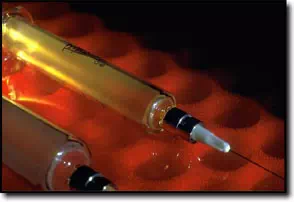 Nebraska
Infectious Medical Waste
Definition of Infectious Medical Waste
Managing Infectious Medical Wastes
OSHA Regulations
Contacts
Statutes, Regulations and Guidelines
More Information
Definition of Infectious
Medical Waste
Infectious medical waste means a solid
waste capable of causing an infectious disease. For a waste
to be deemed infectious, consideration is given to the elements
required in order for infections to occur, such as the presence
of a pathogen or causative organism, of significant virulence
in an adequate dose, which is able to gain a portal of entry
in a susceptible host. Infectious waste includes, but is not
limited to the following:
- Blood, blood products
and body fluids.
- Infectious sharps waste.
- Laboratory waste including
all cultures and stocks of infectious agents, as specimen cultures
from medical and pathological laboratories, wastes from the
production of medical and pathological laboratories, wastes
from the production of biologicals, discarded live and attenuated
vaccines, and culture dishes and devices used to transfer,
inoculate and mix cultures.
- Contaminated animal
waste.
- Waste identified by
infectious waste generators which includes those wastes determined
by the infectious waste generator or the infectious waste generator's
infectious control staff to be treated as infectious waste
because of the risk of disease.
Managing
Infectious Waste
The management of medical
waste, which is not infectious, is not specifically addressed in Nebraska
Title 132 Integrated Solid Waste Management Regulations. Most
medical or veterinary wastes may be disposed at a permitted municipal
solid waste disposal area as long as they have not been contaminated
with something that is considered infectious. These wastes may include
dressings, laboratory wastes, animal bedding, waste or carcasses. The
landfill or hauler of medical or veterinary wastes may have additional
restrictions or disposal requirements specific to the disposal facility.
Infectious medical
waste is specifically restricted by the Nebraska Department of Environmental
Quality. It is the responsibility of the generator of the waste
to determine if it is infectious and to handle it properly. According
to Title
132, Chapter 13, "infectious wastes must not be disposed of at
any solid waste disposal area unless such wastes are first rendered
non-infectious by incineration, autoclaving, or other treatment method". This
provision does not apply to infectious waste from households. Prior
written approval from the Nebraska Department of Environmental Quality
for disposal at a municipal solid waste landfill is not required
for infectious wastes that have been rendered non-infectious.
Household medical waste
is any waste that is generated as a result of health care activities
in the home. In may include bandages, hypodermic needles and lancets. Medical
waste generated in the home is a health concern when it is infectious
waste. This infectious waste should be treated so the waste is no
longer infectious or properly packaged so that the risk of exposing
others to possible infection is reduced. Properly treated or packaged
household medical waste can be added to your general household waste
or transported to a permitted municipal solid waste landfill.
Packaging of
Infectious Medical Waste
NDEQ recommends the
following guidelines for packaging and transporting infectious wastes
generated in the home:
- Placement of the waste in a rigid or semi-rigid, puncture
resistant and leak-proof container;
- Marking the container prominently with the universal
Bio-hazard symbol;
- Labeling "Infectious Waste" or "Bio-hazard Waste";
- Sealing the container; and
- Insuring that the outside of the container is free
from contamination.
OSHA Regulations
In addition to the state medical waste environmental
regulations there are some Occupational Safety and Health Administration
(OSHA) rules that apply to medical/infectious waste. Nebraska is
one of 26 states covered entirely by the federal OSHA program. This
program is operated by the Occupational Safety and Health Administration. OSHA
rules (Occupational Exposure to Bloodborne Pathogens Standards) impact
various aspects of medical/infectious waste, including management
of sharps, requirements for containers that hold or store medical/infectious
waste, labeling of medical/infectious waste bags/containers, and
employee training. These requirements can be found in the VetCA section
entitled OSHA Standards for Regulated Waste.
Statutes, Regulations
and Guidelines
Nebraska
Title 132 Integrated Solid Waste Management Regulations
Contacts
For more information,
contact NDEQ via MoreInfo@NDEQ.State.NE.US or
phone: 402-471-2186.
NDEQ Field Offices. The
Field Office Section consists of 15 employees who conduct compliance
inspections, complaint investigations, environmental sampling, project
management, and local compliance assistance for the NDEQ's Air Quality,
Waste Management and Water Quality Divisions.
More Information
In this section, you
will find links to points of contacts at the Nebraska agencies responsible
for regulating healthcare facility waste, links to the text of the
regulations, and additional resources that you might find of interest
on this topic.
Medical
Waste Disposal Fact Sheet.
|

